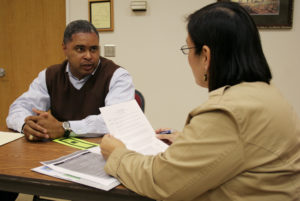Most of the time, when I read articles on storytelling applications or techniques, my brain clicks into asking: “Can I apply this information to the job search or career advancement?”
Shawn Callahan recently posted an interesting entry on the Anecdote blog, How to tell a story about yourself without sounding like an ego-maniac, in which he discusses “tell[ing] a story that doesn’t sound like you are just blowing your own trumpet.” Shawn is right that in many networking and business situations, you don’t want to put people off by telling a boastful story.
Shawn offers the story he tells on this video of how he got into business storytelling — in which he first meets his eventual mentor Dave Snowden — as an example that reveals a lot about Shawn while deflecting attention away from himself, thus informing his audience about him in a non-egotistical way.
Shawn is describing what Annette Simmons has coined as the “Who Am I Story” and Steve Denning calls the “Who Are You Story.” In my new book, Tell Me About Yourself: Storytelling to Get Jobs and Propel Your Career, I call it the Quintessential You Story because its captures the quintessence of who you are.
Keep in mind that in a situation like a job interview, a story like Shawn’s would reveal many job-related characteristics (he lists them in his blog entry) but might be too modest.
 I often caution job-seekers to be sure they give themselves sufficient credit in their job-search stories. For example, many stories a job-seeker might tell in an interview deal with team projects and follow a formula like this: The team was faced with [this situation]; the team took [this action]; and [this result] ensued.
I often caution job-seekers to be sure they give themselves sufficient credit in their job-search stories. For example, many stories a job-seeker might tell in an interview deal with team projects and follow a formula like this: The team was faced with [this situation]; the team took [this action]; and [this result] ensued.
Great, but what was the job candidate’s role in the team’s success? The hiring manager will want to know. When describing a team project, make your role clear, and give yourself credit for your contribution to the team’s accomplishment.
The Quintessential You Story that is probably my favorite is, in my opinion, not egotistical, but also does not deflect attention to others. You can read it starting here.
In this story about a young women who befriends an Alzheimer’s patient and fills a special role for him, we learn that the teller, Kellie, is compassionate, curious, eager to learn, and that she cares enough about patients to go far beyond the requirements of her job to give them comfort.
Bottom line, Shawn’s advice about non-egotistical stories is spot on for many situations. In job-hunting, though, a little ego is not only appropriate but expected. And it’s possible to tell a non-egotistical story in which you are still the star.
